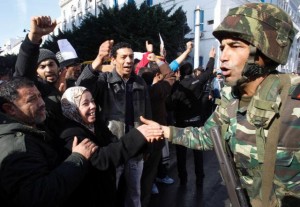By The Associated Press
FILE – In this Monday, Jan. 17. 2011 file photo protestors greet soldiers during a demonstration against former Tunisian President Zine El Abidine Ben Ali in the center of Tunis. A Tunisian democracy group won the Nobel Peace Prize on Friday Oct. 9, 2015 for its contributions to the first and most successful Arab Spring movement.
The Norwegian Nobel Committee cited the Tunisian National Dialogue Quartet “for its decisive contribution to the building of a pluralistic democracy” in the North African country following its 2011 revolution. (AP Photo/Christophe Ena, File)
The Nobel Peace Prize announced Friday pointed to the relative success of Tunisia in building toward democracy after a 2011 uprising ousted a longtime dictator. That makes it a resounding exception among the nations of the Arab Spring revolts.
The award went to four civil society organizations that make up the Tunisian National Dialogue Quartet, which helped guide the North African nation through some its direst moments by bringing Islamists and their opponents into negotiations. Tunisia’s transition to democracy has been battered by a weak economy, terrorist attacks and bickering politicians, but it was able to avert the violent civil breakdown that many had feared.
Here is a glance at the other major Arab uprisings of 2011 and where they stand today:
EGYPT
Inspired by the events in Tunisia, Egyptians were next to take to the streets, with millions participating in protests that led to the Feb. 11, 2011 removal of Hosni Mubarak, the U.S. ally who had ruled Egypt for 29 years with an authoritarian grip.
After his fall, the military stepped into rule, until the country’s first ever free elections in 2012 created a parliament dominated by the Muslims Brotherhood and other Islamists and a prominent Brotherhood figure, Mohammed Morsi, won the presidency. Soon, however, opponents accused the Brotherhood of seeking to impose its own grip.
On the year anniversary of Morsi’s election, gigantic protests demanding his removal were held around the country and on July 3, 2013, the military — then led by army chief Abdel-Fattah el-Sissi — removed Morsi. The ensuing crackdown on Islamists has been bloody, with hundreds killed and thousands jailed. Islamic militant violence is on the rise, and al-Sisi’s government has been accused of implementing oppressive policies reminiscent of the Mubarak-era.
SYRIA
Syria’s uprising took the most horrific turn of any of the Arab Spring nations: A civil war that has killed more than 250,000 lost lives and driven some 12 million people — nearly half the pre-war population— from their homes. Much of the country is in the hands of the radical Islamic State group, Syrian refugees have overwhelmed neighboring nations, and tens of thousands of Syrians have migrated to Europe this year.
After early efforts to remove President Bashar Assad from power through peaceful protests, the government responded, with a heavy hand, and the protests turned into an armed uprising, and eventually a brutal civil war. The indiscriminate use of chemical weapons and barrel bombs further led to the radicalization of a segment of the country’s population. Sectarian hatreds have been fanned. All the while, Assad maintains his grip on his core terriroty, including the capital Damascus.
LIBYA
It took a civil war to oust Libyan dictator Moammar Gadhadfi, who after months of fighting with rebels was ousted and killed in mid-2011. Ever since, the country has slid into greater and greater chaos. Rebel factions turned into local militias that never gave up their weapons and carved out power centers of their own, while the central government never gained authority and the military and police were never rebuilt.
For much of the past year, Libya has had two governments, one dominated by Islamists and based in Tripoli, the other made up of anti-Islamist groups based in the eastern city of Tobruk, each backed by their forces which have been battling on the ground. All the while, militants including the Islamic State group have gained ground. After months of talks, the U.N. this week proposed a national unity government, the strongest attempt yet to stem the country’s collapse.
YEMEN
It took nearly a year of protests for Yemenis to oust their long-serving President Ali Abdullah Saleh. Neighboring Gulf countries finally brokered a deal that granted him amnesty if he stepped down, allowing his vice president Abed Rabbo Mansour Hadi to take over.








